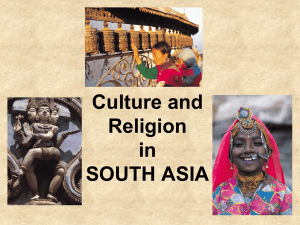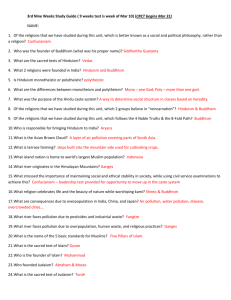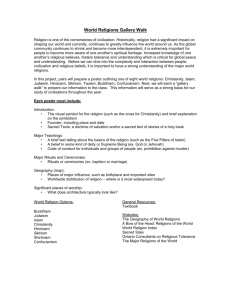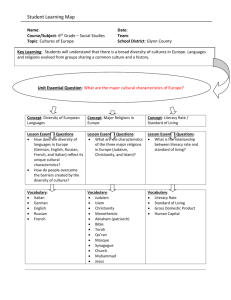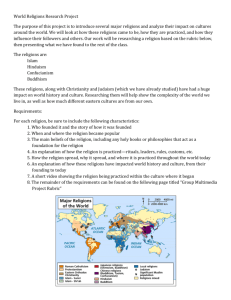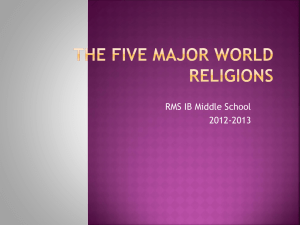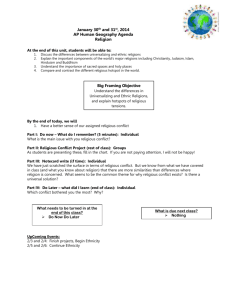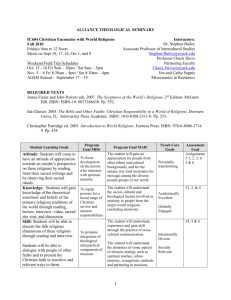The Meanings of Religions to People
advertisement
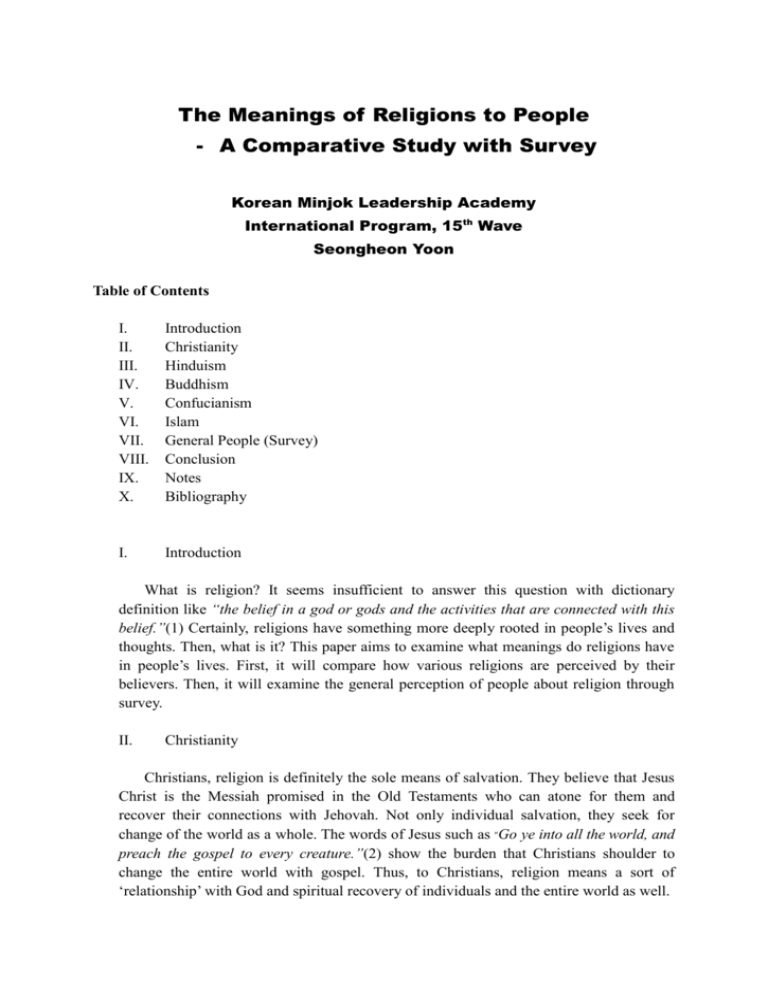
The Meanings of Religions to People - A Comparative Study with Survey Korean Minjok Leadership Academy International Program, 15th Wave Seongheon Yoon Table of Contents I. II. III. IV. V. VI. VII. VIII. IX. X. Introduction Christianity Hinduism Buddhism Confucianism Islam General People (Survey) Conclusion Notes Bibliography I. Introduction What is religion? It seems insufficient to answer this question with dictionary definition like “the belief in a god or gods and the activities that are connected with this belief.”(1) Certainly, religions have something more deeply rooted in people’s lives and thoughts. Then, what is it? This paper aims to examine what meanings do religions have in people’s lives. First, it will compare how various religions are perceived by their believers. Then, it will examine the general perception of people about religion through survey. II. Christianity Christians, religion is definitely the sole means of salvation. They believe that Jesus Christ is the Messiah promised in the Old Testaments who can atone for them and recover their connections with Jehovah. Not only individual salvation, they seek for change of the world as a whole. The words of Jesus such as “Go ye into all the world, and preach the gospel to every creature.”(2) show the burden that Christians shoulder to change the entire world with gospel. Thus, to Christians, religion means a sort of ‘relationship’ with God and spiritual recovery of individuals and the entire world as well. III. Hinduism When people think of Hindus, the first image that comes into their mind is probably a extremely thin monk doing yoga, which seems quite painful. Although it is not everything bout Hinduism, yoga is certainly a vital part in Hindu beliefs. Through various types of yogi, Hindus seek for gradual progression toward perfection. To them, their life is just a part of a long, almost eternal, path toward spiritual perfection. Hindus try to reach the point of perfection slowly and steadily. Thus, to Hindus, religion is considered as a guideline for them to carry out their own karma, or their path toward perfection. IV. Buddhism Sharing its Indian origin with Hinduism, Buddhism shows similarity with Hinduism in some of its ideas such as reincarnation. However, it is different that Buddhism doesn’t suggest a specific ceremony or doctrine to reach the point of perfection, or nirvana. Rather, Buddhists try to reach nirvana by contemplation and meditation. Although there’s difference among the branches, Buddhism, especially Mahayana, also tries to lead the entire humanity toward the state of perfection. For example, Bodhisattvas are those who are believed to have reached the point of nirvana but stays in the mundane world to lead the entire humanity. V. Confucianism Actually, Confucianism is more in the realm of ethics rather than that of religion. Although it involves spiritual conviction in dead ancestors and philosophers, it is insufficient to say that Confucianism involves any sort of ‘belief in a god or gods.’ Rather, Confucianism is considered as a type of ethics and political ideology. Also, as Korea is a country with long tradition of Confucianism, Koreans seem to think of Confucianism not essentially a spiritual belief but just a part of tradition that they have to cherish. Thus, it seems appropriate to say that people generally consider Confucianism as in the spectrum of ethics and tradition. VI. Islam Sharing the so-called Abrahamic origin, Islam shows quite many similarities with Christianity in its basic ideas. However, regarding Islam doctrines and institutes, we discover that Islam is more fundamentalistic and reaches deeper in people’s daily lives. For instance, think of Sharia, the Islam law code. Dealing with various topics encompassing crime, politics, economy, prayer, fast, and even personal hygiene, Sharia sets up the duties that Muslims have to perform. Thus, to Muslims, their religion means ‘duty’ which they have to perform in order to reach the point of perfection, salvation. VII. General People (Survey) Then, how do people generally consider religion regardless of whether they have one or what religion they have? To solve this question, I conducted a survey on twenty KMLA students with a questionnaire as follows. 1) Do you have a religion? If so, what is the religious conviction you hold? For those who answered “yes”, please answer question 2&3, for those who didn’t, please go to question 4~6 2) What do you think is the goal of religion? a. for getting into a better afterlife (heaven, reincarnation, etc) b. to solve and get consolation about the hardships that you face in reality c. to improve your personality d. etc. 3) Which, from 0 to 10, is the ideal proportion of life being engaged in religion? (0 : being never engaged in religious affairs/ 10 : dedicating your entire life into religion, like monks in monasteries) 4) What do you think of the existence of god? a. God never exists and is merely an imagination of people. b. God exists, but not in the way that people believe. (We can never know who god is) c. God may exist in the way that a certain religion believes, but I’m not sure which is the religion. d. I have no idea. 5) Why do you think people have religions? a. for getting into a better afterlife (heaven, reincarnation, etc) b. to solve and get consolation about the hardships that they face in reality c. to improve their personalities d. etc. 6) What is the reason that you don’t have religion? a. because all religions are meaningless : they are mere imaginations. b. because most religious institutions are corrupted. c. I want to have a religion, but I can’t because of the circumstances. d. etc And the result was as follows: 1. Yes Protestant 5 Catholic 2 2. A 3 No 11 Buddhism 2 Total 20 B 4 C 2 D 0 Total 9 4. A 4 B 4 C 2 D 1 Total 11 5. A 1 B 7 C 2 D 1 Total 11 6. A 6 B 3 C 1 D 1 Total 11 3. 0 1 2 3 4 5 6 7 8 9 10 Total average 0 2 0 0 1 2 2 1 0 1 0 9 4.99 Analyzing the result of the survey, we can reach the conclusion that people generally consider religion is a sort of ‘optional ’ part of human life. Although almost half of the surveyed had religions, their answers showed that they didn’t really consider religions essential in their lives. Also, those who answered that they did not have religions showed their doubt on the integrity of religion itself : they thought that religion is merely an imagination that people had created in order to get consolation about their daily lives. VIII. Conclusion The conclusion established through examining the doctrines and institutes of various religions and the general opinion about religion of modern-day people was that although many religions require ‘commitment’ of people on their path toward ‘perfection’, people usually don’t perceive religion so. Many people think religion is just a means of getting consolation. They don’t believe that religion can actually lead people into spiritual perfection. Perhaps this may be the reason why the number of people who actually have a religion is diminishing day by day. Thus, in order to recover the religion’s power in leading the world in a better way, recovering the truth of people on religion’s integrity and power is the first task. IX. Notes (1) Collins Cobuild Advanced Learner’s Dictionary, 6th Edition. Harper Collins Publishers, 2009 (2) Mark, 16:15. KJV X. Bibliography Smith, Huston, Richard Marranca, and Huston Smith. The World's Religions. New York: HarperOne, 2009. Print. Survey : People’s Perception on Religion, conducted by Yoon, Seongheon. 20 KMLA juniors as sample. From December 14 to 16, 2011.
